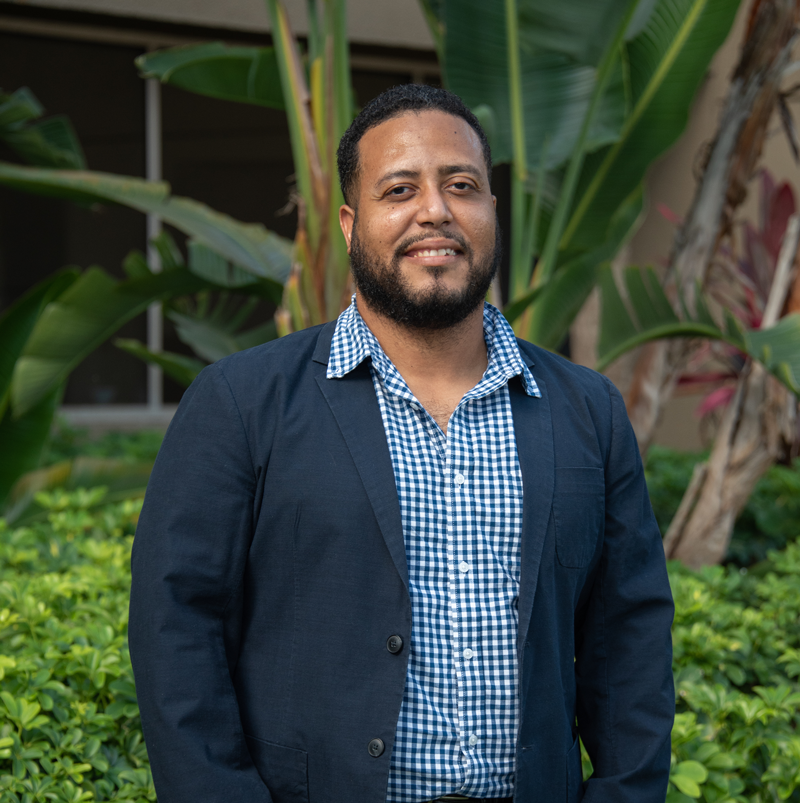July, 2021
Emmanuel Fleurantin, a Ph.D. candidate in mathematical sciences, was awarded a three year fully funded National Science Foundation ASCEND postdoctoral fellowship, set to begin January of 2022. The award will support Fleurantin’s work at the University of North Carolina at Chapel Hill (UNC-CH), where he will work with Chris Jones, Ph.D., the Bill Guthridge Distinguished Professor of Mathematics.
The award supports outstanding future scientists with a focus on achieving excellence through diversity and supporting postdoctoral fellows that will broaden participation of underrepresented minorities in academia as well as across the nation’s scientific enterprise. The fellowship helps prepare postdoctoral fellows transition into the first few years of an academic faculty position, preparing for success in one’s career path.

How did you learn about the Mathematical and Physical Sciences (MPS) ASCEND Fellowship?
I first found out about the MPS ASCEND fellowship from Professor Christopher K.R.T. Jones from UNC Chapel Hill, who emailed me about this wonderful opportunity in the spring 2021 semester. I first met professor Chris Jones through the Dynamics and Data in the COVID-19 Pandemic summer program (2020). He was one of the main organizers of the summer school and also a lead advisor in one of the projects that I was assigned to work on.
How did your collaboration with Chris Jones get started?
He was one of the lead mentors in one of the projects that I was assigned to work on in the Dynamics and Data Summer program. This project had to do with social justice and the spread of COVID-19. The project extended through the academic year and was later the result of a research paper. He was also invited to give a talk at our SIAM student chapter colloquium series in the spring semester of the following year (2021). We are currently collaborating on a project surrounding the Most Probable Escape Paths (MPEPs) in non-gradient systems with added noise.
What will your three year postdoctoral work entail?
The three year postdoctoral fellowship is broken down into several mini-phases or sub-projects. To be more specific, it involves studying the mathematics behind rate-induced tipping and its applications, then working on noise-facilitated rate-induced tipping along with the computational technology behind it; and finally working on the challenge of assimilating data into systems that undergo abrupt change. There are also opportunities to organize summer workshops and other academic outreach activities specifically geared towards broadening the participation of Underrepresented Minorities (URMs) in the MPS field.
What kind of research will you be performing during this three year experience?
I will be working on understanding tipping phenomena through the computations of stable/unstable manifolds of base attractors and complex basin boundaries and their connecting orbits. This can be done through capturing the effect of noise-facilitated tipping through a most probable path connecting orbit and understanding transversality of invariant manifolds in complex systems arising in tipping point problems. I will also be working on assimilating data in tipping problems where some applications include societal problems that require Social Tipping Interventions (STIs) in terms of rate-induced tipping that offers the promise of rapid change in behaviors, and social norms.
What role did FAU Associate Professor Jason-Mireles-James play in helping you with this opportunity?
Dr. Mireles-James was very supportive throughout the entire process. He encouraged me to apply for this opportunity and was there with me every step of the way. He held periodic meetings with me, shared a lot of resources that guided me in the right directions in this proposal and also helped with carefully revising it. Since he is experienced in successfully applying for NSF grants, he had many great insights about the "do’s and dont’s" of proposal writing. He even made himself available after hours and during the weekend to make sure that all was in place. Finally, he helped with finding collaborators and references.
What do you hope the outcomes of this three year experience will be?
It is my hope that this fellowship will help me grow as an applied mathematician and help me be a role model for students from underrepresented communities. I hope that it helps me with publishing promising research articles and eventually help me land a tenure-track faculty position at an R1\R2 university.